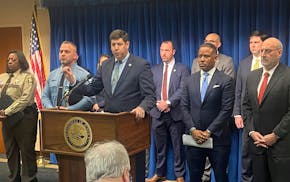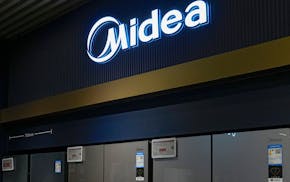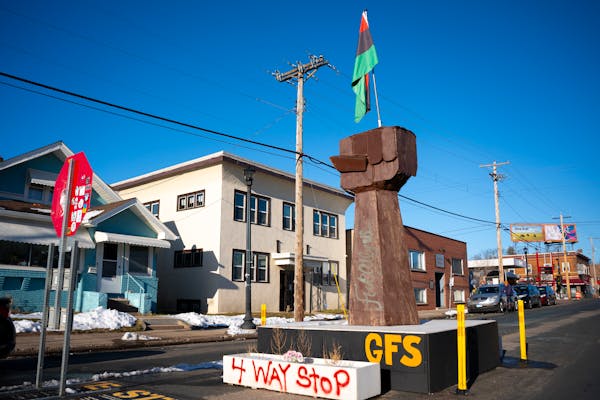There is perhaps nobody who expects everyone who feels invested in the future of George Floyd Square to be satisfied with whatever the city of Minneapolis decides about its upcoming redesign.
The Minneapolis City Council is plunging into the issue anyway, with its Committee of the Whole to review Tuesday a recommended plan to reshape the intersection of 38th Street and Chicago Avenue. The goal is to start construction in 2025, five years after Floyd's murder turned the four blocks near where he died into a site of somber remembrance, an incubator of social revolution and, to some, a painful display of neglect and systemic racism.
Following two town hall meetings about the recommendations — one organized by the city and the other by residents — Council Member Andrea Jenkins, who represents the area, said residents and others with strong attachments to the site aren't any closer to a unified vision for George Floyd Square.
"I guess it's like the American electorate – very divided," Jenkins said.
The plan released by the city in late October involves reconstructing stretches of 38th and Chicago with new sidewalks, pedestrian ramps, lighting and green spaces. The intersection of the two roads would feature a raised traffic circle.
Monuments and artwork would be preserved. Traffic would not be allowed to pass over the area where Floyd was murdered by police. And a yet-to-be identified nonprofit would redevelop the "People's Way" former gas station into a community space.
The plan would also restore Metro Transit D Line and Route 5 bus service to the area and maintain vehicle access.
In interviews and public statements during the town halls, residents have repeatedly insisted redevelopment plans must benefit nearby residents and business owners. Many doubt the recommended plan would achieve that. And many accused the city of glossing over the feedback it has been provided.
"This is four years of the city telling us what they want," said Marquise Bowie, who grew up and works in the neighborhood. "There's a lot of tourism without people investing in our community."
Anthony Taylor, the community development lead for the Cultural Wellness Center, who collaborated on the city's plan, emphasized that it is meant to be a "flexible design" that allows for maintenance of all monuments, provides spaces for civic discourse and maintains transit services for residents.
"I think all of those elements are being delivered," said Taylor, a longtime resident of the area.
That the plan would preserve vehicle access and that construction would begin before various social justice demands from community activists are met appear to be two of the biggest issues among residents. Here's an overview of the dynamics behind them:
Residents want more investment in neighborhood
For many community members, talk of redevelopment is a nonstarter until after the city invests more into the neighborhood — a historically Black economic district.
Community members near the square have described how the intersection has become a tourist destination in the years since the murder. They are wary that a big redevelopment would create a domino effect that could ultimately leave longtime residents displaced.
"What's going to happen with property taxes? Who's going to start buying houses in this neighborhood?" asked Jeanelle Austin, the executive director of Rise and Remember, a nonprofit that works at the square. "These are the things that start to build that pathway toward displacement injustice."
In the aftermath of Floyd's murder, community members drafted 24 "demands for justice" from the city. The demands cover issues such as accountability from law enforcement, housing, employment and health services.
Over the last four years, half of the demands have been met, Austin said.
At a Nov. 6 town hall of about 200 organized by Rise and Remember, audience members loudly applauded any time speakers advocated for the city to halt its redevelopment plan until more demands have been met by the city.
"We cannot get back to the status quo," Marcia Howard, a resident and community organizer, said in an interview. "They have to make recompense for their systemic racism."
Sentiments run strong in the other direction from community members who say there's no more time for delay.
Sam Willis, the owner of Just Turkey at 3731 Chicago Av., said the process has already taken too long. He said the aesthetics of the square are not inviting to customers, that there's a perception the area is not safe, and that tourists visiting the square do not patronize businesses nearby.
The circumstances have put an "economic strain on businesses," he said, and the square should be "the prettiest area in the entire state."
"We've been at this for four and a half years now, so I really can't buy into the theory that we got to slow down," Jenkins said.
Disagreement over cars on Chicago Avenue
Allowing vehicles to pass through the area on Chicago Avenue may be the most contentious part of the plan being submitted to the City Council.
It gets at a central issue with the redevelopment: how to preserve the square as a sacred space without inconveniencing those who live and work nearby.
City staff recommends traffic be maintained through the square. But there are many community members, including Jenkins, who don't want cars passing through.
According to the recommended plan, blocking traffic on Chicago Avenue would divert cars to other nearby streets, which are narrower and allow parking on both sides. Residents said they worry about reckless driving and unsafe conditions for pedestrians and bikers as a consequence.
In the town hall meetings, some residents said they are also worried about reckless driving and speeding on Chicago Avenue during protests and demonstrations. They said the road should be closed to vehicle traffic to add to the gravity of a site with global social justice significance.
"They [the city] do not want a place where we can gather and gain power and be a community again," said resident Casper Warren. "They want a pretty sight to see as they are speeding on past our neighborhood where they do not live."
One thing many seem to agree on is restoring bus service in the area. The Metro Transit D Line and Route 5 services have been detoured around 38th and Chicago since Floyd's murder.
Many residents chose to live in the area for its transit services prior to 2020, according to the city. And Jenkins said the detours have inconvenienced many.
"This community has been bereft of amenities," she said.
University of Minnesota proposes 7% budget cuts and largest tuition hike in more than a decade

Five members of Minneapolis Highs street gang found guilty of racketeering conspiracy

Search for Twin Cities teen missing for nearly month now focusing on landfill
Lawmakers strike a deal on state budget, Gov. Tim Walz calls Monday special session

